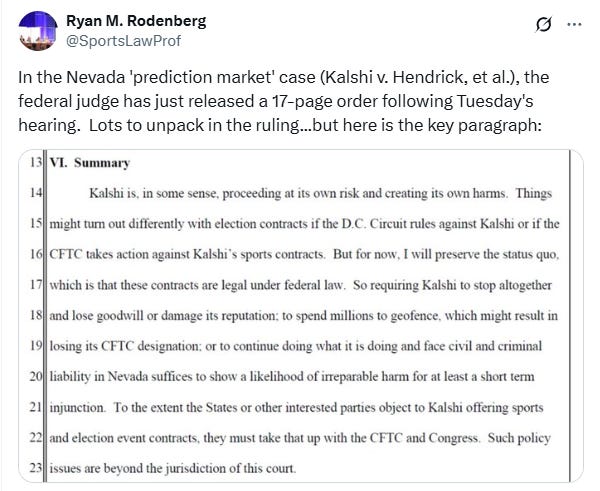The First 100 Days
After launching election markets in October, Kalshi jumped into sports markets in January, and it's been non-stop news ever since.
The first 100 days of any presidency are a period of change. Executive orders are signed in bunches, future policy positions are laid bare, and hints emerge about how effective — and disruptive — the term might be.
The second Trump term has certainly been that, with a highly polarized electorate watching and reacting to every move. In the gambling industry, a similar jolt arrived with Trump’s second term.
Kalshi, fresh off winning the right to offer election markets, dove headfirst into sports betting — a move that’s plunged the gambling industry into chaos as swiftly as any executive order.
And just as a president’s early actions signal their approach to governing, Kalshi’s foray into sports markets reveals its ambition to reshape the betting landscape, challenging regulators and traditional sportsbooks alike with a move as polarizing as any political gambit.
STTP MESSAGE: Looking to connect with a highly engaged gambling industry audience?
Straight to the Point offers tailored sponsorship packages to elevate your brand.
STTP delivers daily, expert-driven gambling news in concise updates from a top industry thought leader. With nearly 4,000 subscribers—including legislators, regulators, gaming executives, key influencers, investment firms, and passionate consumers—STTP is a trusted resource driving over 115,000 monthly views and boasting high engagement.
Why spend a fortune on gaming conferences? STTP gets your brand in front of the same decision-makers and influencers at a fraction of the cost, delivering targeted exposure where it matters most.
Reach out today to explore sponsorship options!
Just Getting Started
Kalshi’s strategy has been described as “move fast and break things,” showing no signs of slowing down.
As the judge in the recent hearing in Nevada wrote (my words, not his, the judge’s are in the tweet below): Kalshi is involved in a high-risk, high-reward gambit.
At the end, you may have noticed the judge made the same case Kalshi has been making; what I dubbed on X as the reverse Johnny Behan from the movie Tombstone: "This is not county business. This is a town matter." More plainly put, if you have an issue with Kalshi’s sports markets, take it up with the CFTC or Congress.
I will keep hammering this point home, but what started as, ‘can we offer a market on which party will control Congress following the 2024 election,’ morphed into all manner of sports markets in less than three months (that initial case is still under appeal). Imagine what the next six months will look like if it gets some level of green light to offer sports markets.
As Steve Brubaker recently tweeted (and I don’t think he’s telling anyone what they don’t already know), “And know that they will expand their offerings into every imaginable sports market and offer props, parlays, SGPs, etc. If you see it on DraftKings, you'll see it on Kalshi. They'll make money if the courts give them sports betting.”
No One to Blame Except Your Own Past Actions
As I noted in yesterday’s newsletter, if the CFTC sides with Kalshi (and to what extent any guardrails are placed on the types of markets it can offer), we are in for a mammoth shift in sports betting and gambling.
We are watching, in real-time, the line between financial derivatives and gambling blur. For better or worse, Kalshi’s model challenges that boundary, and regulators, leagues, and sportsbooks are grappling with it.
And the industry is partly to blame. Its insistence on referring to itself as gaming and not gambling has muddied the waters. What was supposed to be an interchangeable term is now being parsed.
Legalization efforts in recent years have increasingly leaned on clever phrasing—calling DFS entry fees or skill-based contests anything but gambling. I’ve watched people pat themselves on the back and these tactics applauded as savvy, but they’ve set a dangerous precedent and opened a Pandora’s box that is starting to look impossible to close.
As I previously wrote, it’s gotten to the point that states adopt similar tactics to legalize products, like New York calling DFS a game of skill to avoid a constitutional amendment or saying online sports betting isn’t an expansion of gambling, rather, it’s a different delivery channel of an already legal product.
And now the same tactics are being used by the other side.
The industry is pushing back against the many versions of gray slot machines (VGTs, VLTs, eBingo, HHRs, and skill games) and the dual-currency sweepstakes model. Is it any wonder the industry is now engaged in a fight over what the Commodity Exchange Act (CEA) meant by “gaming?”
Again, my concern isn’t what Kalshi and others are doing — make it legal, highly regulated, and I’m happy. My concern is what someone does next.
What happens when someone comes along and says such and such law doesn’t pertain to online card games (or table games) because “technically” it doesn’t use cards or gaming equipment? Or argues that card games fall into the event contracts bucket? And if card games do, surely all table games do. And if table games do, what about slots (in their many varied forms)?
It sounds preposterous, but so did the current situation just a few years ago. Ten years ago, the idea that New Jersey would win its PASPA case was a fingers-crossed dream, never mind 50-state, 18+ sports betting, overseen by the CFTC.
Keep reading with a 7-day free trial
Subscribe to Straight to the Point to keep reading this post and get 7 days of free access to the full post archives.





